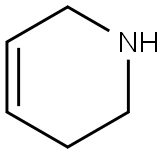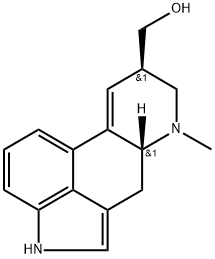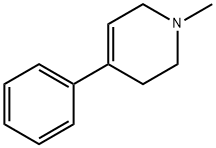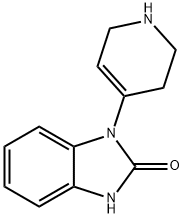1,2,3,6-TETRAHYDROPYRIDINE
- CAS NO.:694-05-3
- Empirical Formula: C5H9N
- Molecular Weight: 83.13
- MDL number: MFCD00005949
- EINECS: 211-766-2
- SAFETY DATA SHEET (SDS)
- Update Date: 2024-12-18 14:08:52

What is 1,2,3,6-TETRAHYDROPYRIDINE?
Chemical properties
Clear colorless to pale yellow liquid
The Uses of 1,2,3,6-TETRAHYDROPYRIDINE
Organic intermediate.
The Uses of 1,2,3,6-TETRAHYDROPYRIDINE
Used to form ene-endo-spirocyclic ammonium ylids for [2,3]-sigmatropic rearrangement to pyrroloazepinones and oxazepinones.
What are the applications of Application
1,2,3,6-Tetrahydropyridine is used to form ene-endo-spirocyclic ammonium ylids
Definition
ChEBI: 3-piperideine is a piperideine.
General Description
A colorless liquid. Density 0.913 g / cm3 and insoluble in water. Hence floats on water. Flash point near 110°F. Vapors heavier than air. Used to make other chemicals.
Air & Water Reactions
Flammable. Insoluble in water.
Reactivity Profile
1,2,3,6-TETRAHYDROPYRIDINE neutralizes acids in exothermic reactions to form salts plus water. May be incompatible with isocyanates, halogenated organics, peroxides, phenols (acidic), epoxides, anhydrides, and acid halides. Flammable gaseous hydrogen may be generated in combination with strong reducing agents, such as hydrides.
Health Hazard
May cause toxic effects if inhaled or absorbed through skin. Inhalation or contact with material may irritate or burn skin and eyes. Fire will produce irritating, corrosive and/or toxic gases. Vapors may cause dizziness or suffocation. Runoff from fire control or dilution water may cause pollution.
Fire Hazard
HIGHLY FLAMMABLE: Will be easily ignited by heat, sparks or flames. Vapors may form explosive mixtures with air. Vapors may travel to source of ignition and flash back. Most vapors are heavier than air. They will spread along ground and collect in low or confined areas (sewers, basements, tanks). Vapor explosion hazard indoors, outdoors or in sewers. Runoff to sewer may create fire or explosion hazard. Containers may explode when heated. Many liquids are lighter than water.
Properties of 1,2,3,6-TETRAHYDROPYRIDINE
| Melting point: | −48 °C(lit.) |
| Boiling point: | 108 °C(lit.) |
| Density | 0.911 g/mL at 25 °C(lit.) |
| refractive index | n |
| Flash point: | 61 °F |
| solubility | Chloroform (Slightly), Methanol (Slightly) |
| pka | 10.22±0.10(Predicted) |
| form | Powder |
| color | White to pale yellow-cream |
| Stability: | Light Sensitive |
| CAS DataBase Reference | 694-05-3(CAS DataBase Reference) |
| EPA Substance Registry System | Pyridine, 1,2,3,6-tetrahydro- (694-05-3) |
Safety information for 1,2,3,6-TETRAHYDROPYRIDINE
| Signal word | Danger |
| Pictogram(s) |
 Flame Flammables GHS02  Exclamation Mark Irritant GHS07 |
| GHS Hazard Statements |
H225:Flammable liquids H315:Skin corrosion/irritation H319:Serious eye damage/eye irritation H335:Specific target organ toxicity, single exposure;Respiratory tract irritation |
| Precautionary Statement Codes |
P210:Keep away from heat/sparks/open flames/hot surfaces. — No smoking. P302+P352:IF ON SKIN: wash with plenty of soap and water. P305+P351+P338:IF IN EYES: Rinse cautiously with water for several minutes. Remove contact lenses, if present and easy to do. Continuerinsing. |
Computed Descriptors for 1,2,3,6-TETRAHYDROPYRIDINE
New Products
(S)-3-Aminobutanenitrile hydrochloride 4-Methylphenylacetic acid N-Boc-D-alaninol N-BOC-D/L-ALANINOL Tert-butyl bis(2-chloroethyl)carbamate 3-Morpholino-1-(4-nitrophenyl)-5,6-dihydropyridin- 2(1H)-one Furan-2,5-Dicarboxylic Acid Tropic acid 1-Bromo-3,5-Di-Tert-Butylbenzene S-2-CHLORO PROPIONIC ACID ETHYL ISOCYANOACETATE 2-Bromo-1,3-Bis(Dimethylamino)Trimethinium Hexafluorophosphate 4-IODO BENZOIC ACID 3-NITRO-2-METHYL ANILINE 1-(2,4-DICHLOROPHENYL) ETHANAMINE (2-Hydroxyphenyl)acetonitrile 4-Bromopyrazole 2-(Cyanocyclohexyl)acetic acid 4-methoxy-3,5-dinitropyridine 1-(4-(aminomethyl)benzyl)urea hydrochloride 2-aminopropyl benzoate hydrochloride diethyl 2-(2-((tertbutoxycarbonyl)amino) ethyl)malonate tert-butyl 4- (ureidomethyl)benzylcarbamate Ethyl-2-chloro((4-methoxyphenyl)hydrazono)acetateRelated products of tetrahydrofuran








You may like
-
 1,2,3,6-Tetrahydropyridine CAS 694-05-3View Details
1,2,3,6-Tetrahydropyridine CAS 694-05-3View Details
694-05-3 -
 2033-24-1 98%View Details
2033-24-1 98%View Details
2033-24-1 -
 1975-50-4 98%View Details
1975-50-4 98%View Details
1975-50-4 -
 2-HYDROXY BENZYL ALCOHOL 98%View Details
2-HYDROXY BENZYL ALCOHOL 98%View Details
90-01-7 -
 2-Chloro-1,3-Bis(Dimethylamino)Trimethinium Hexafluorophosphate 221615-75-4 98%View Details
2-Chloro-1,3-Bis(Dimethylamino)Trimethinium Hexafluorophosphate 221615-75-4 98%View Details
221615-75-4 -
 61397-56-6 CIS BROMO BENZOATE 98%View Details
61397-56-6 CIS BROMO BENZOATE 98%View Details
61397-56-6 -
 14714-50-2 (2-Hydroxyphenyl)acetonitrile 98+View Details
14714-50-2 (2-Hydroxyphenyl)acetonitrile 98+View Details
14714-50-2 -
 118753-70-1 98+View Details
118753-70-1 98+View Details
118753-70-1